Enjoy a slice of Basilicata with this traditional Italian pasta frittata. This easy and satisfying dish is made with just a few ingredients and can be ready in only 25 minutes. Whether you’re in a rush or simply want to enjoy a classic Italian recipe, this frittata delivers great flavor with minimal fuss.
History
What does the word frittata mean? There is an Italian expression ‘hai fatto una frittata’ which more or less means you have made a mess (figuratively or literately!). Perhaps, the expression came into being when a frittata was merely a way to use up whatever leftovers were in the fridge and not actually considered a culinary delight!
However, the humble frittata or Italian omelet (as it is sometimes called ) has gone up in the world and can be found on many English language and Italian recipe sites and has even had articles written about it!
There are a number of traditional recipes from different regions for pasta frittata, especially in Southern Italy, like this one for frittata di vermicelli di Basilicata. However, pasta frittata is a versatile dish that can include almost anything you have in the fridge, as long as it goes with pasta and eggs!
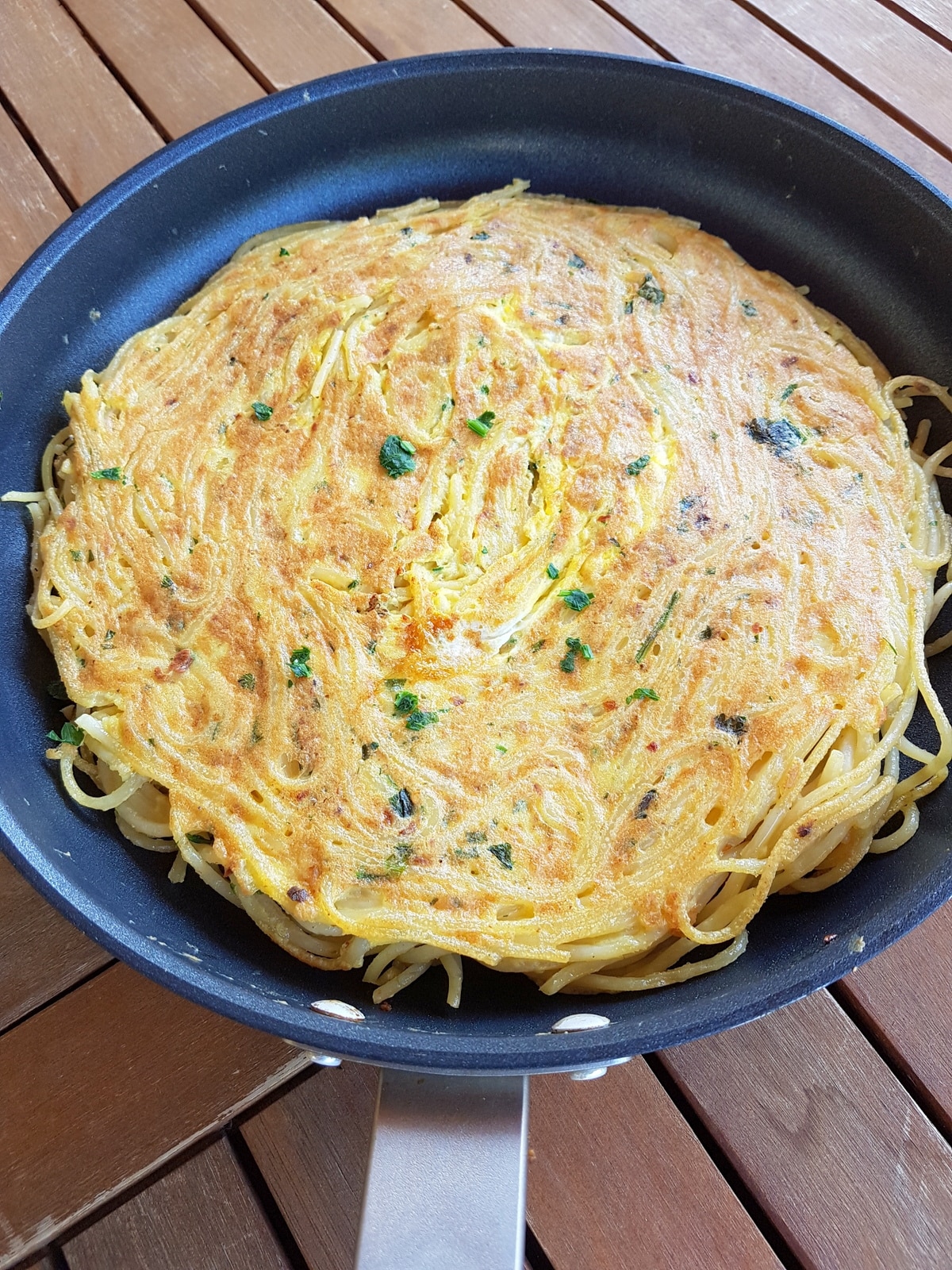
Of course, you don’t need to have leftovers to make a pasta frittata. Nowadays, many people just choose to make it from scratch. Some also deliberately cook extra the day before in order to make a frittata the following day.
Italians aren’t big breakfast eaters and what breakfast they do eat is normally sweet. So, frittata with or without pasta is not a typical breakfast choice here. It’s a quick light meal or snack.
This recipe from Basilicata has only a few ingredients but it’s very tasty. You may find the idea of anchovies in it strange, but I have to say they give it a great depth of flavor. To my mind, it tastes like pasta ‘aglio, olio peperoncino’ (yes it contains peperoncino!). So, if you like that pasta recipe you must give this one a try!
Ingredients
Pasta: Vermicelli is traditionally used in this Basilicata-style frittata for its fine texture, which blends seamlessly with the eggs. However, any long pasta such as spaghetti or bavette works well!
Eggs: They serve as the base of the frittata, binding the ingredients together and giving the dish its characteristic texture and taste. For the best results, make sure to use fresh, large organic eggs.
Garlic: Finely chopped garlic infuses the dish with a subtle, aromatic flavor that complements the other ingredients without overpowering them.
Anchovies: These small fish are potent in flavor and add a rich umami depth. You can use either finely chopped salted or oil-preserved anchovies. If using salted anchovies be sure to rinse them well.
Peperoncino Flakes: Add a gentle heat that can be adjusted according to personal taste.
Parsley: Fresh, chopped parsley not only adds color but also a fresh, herbal flavor that balances the richness of the eggs and anchovies.
Extra Virgin Olive Oil: Used for sautéing, it adds a hint of richness and flavor to the dish.
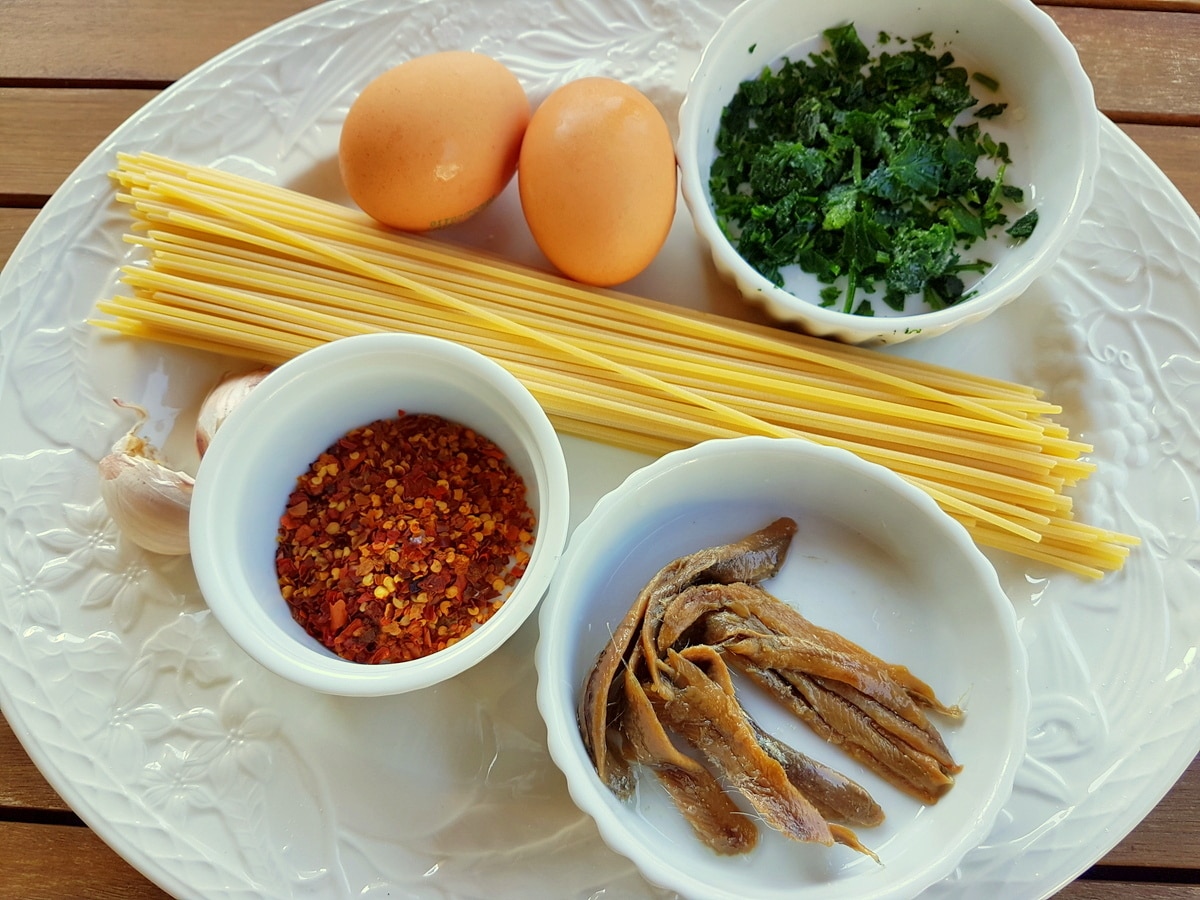
Expert Tips
Using a Non-Stick Pan: If using a regular skillet rather than a non-stick pan, make sure to use plenty of olive oil to coat the bottom and sides of the pan thoroughly. This will help prevent the pasta and eggs from sticking to the pan, ensuring that the frittata can be cooked evenly and turned or removed easily without breaking.
Flipping the Frittata: An easy way to flip the frittata is to use a large plate to cover the skillet, carefully turn the skillet upside down to transfer the frittata onto the plate, then gently slide it back into the skillet to cook the other side.
Alternatively, if you’re hesitant to flip it and you are using a broiler-safe pan (not a non-stick pan), you can finish cooking the top under a broiler for a few minutes until it’s crispy.
Step by Step Instructions
1) If using uncooked pasta, cook the pasta in a large pot of boiling salted water until al dente, according to package instructions. Drain and let cool.
2) In a large skillet, heat extra virgin olive oil over medium heat. Add the finely chopped anchovies, peperoncino flakes, and chopped garlic. Stir regularly until the garlic softens and the anchovies begin to break down. Be careful not to brown the garlic.
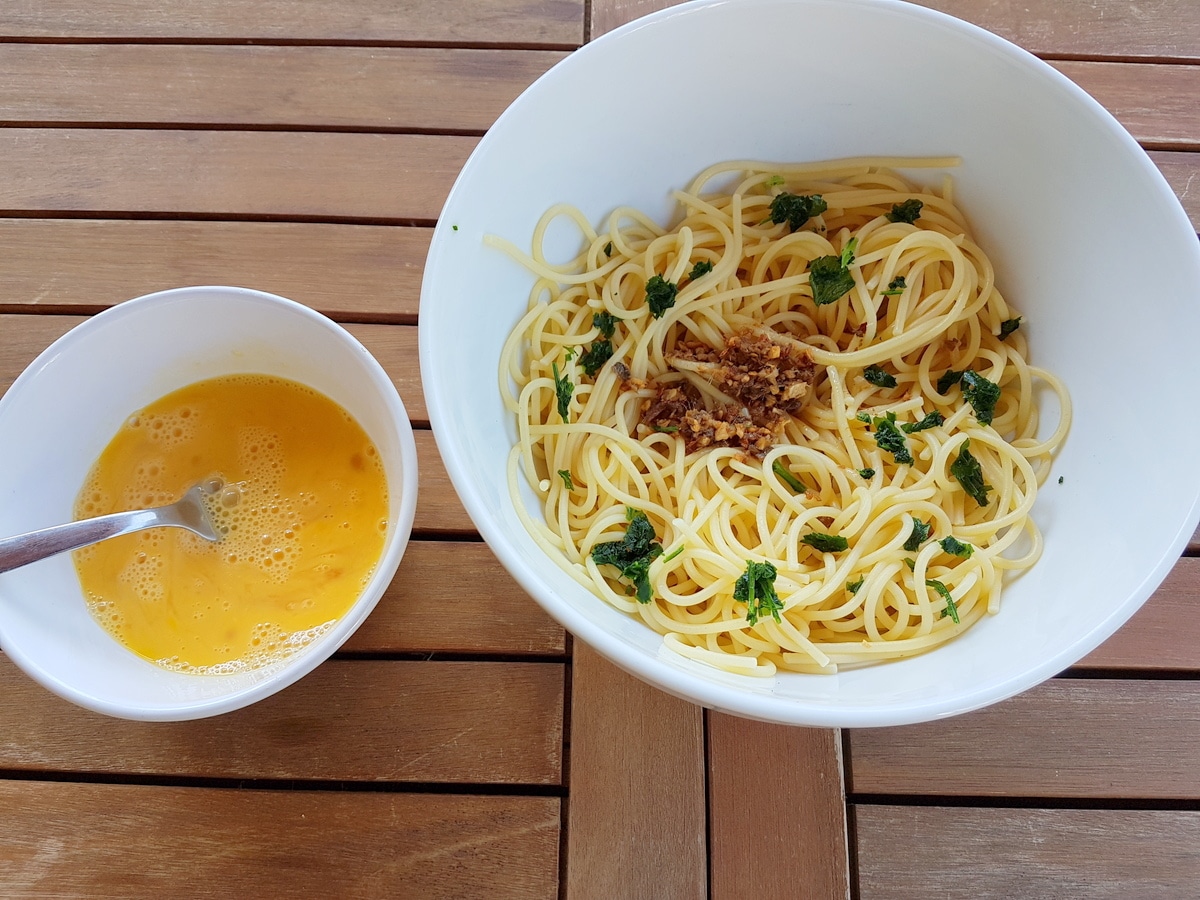
3) In a large mixing bowl, combine the cooled pasta with the garlic and anchovy mixture. Add the already beaten eggs into the bowl with the chopped parsley, and season with salt and ground black pepper. Stir thoroughly until well combined.
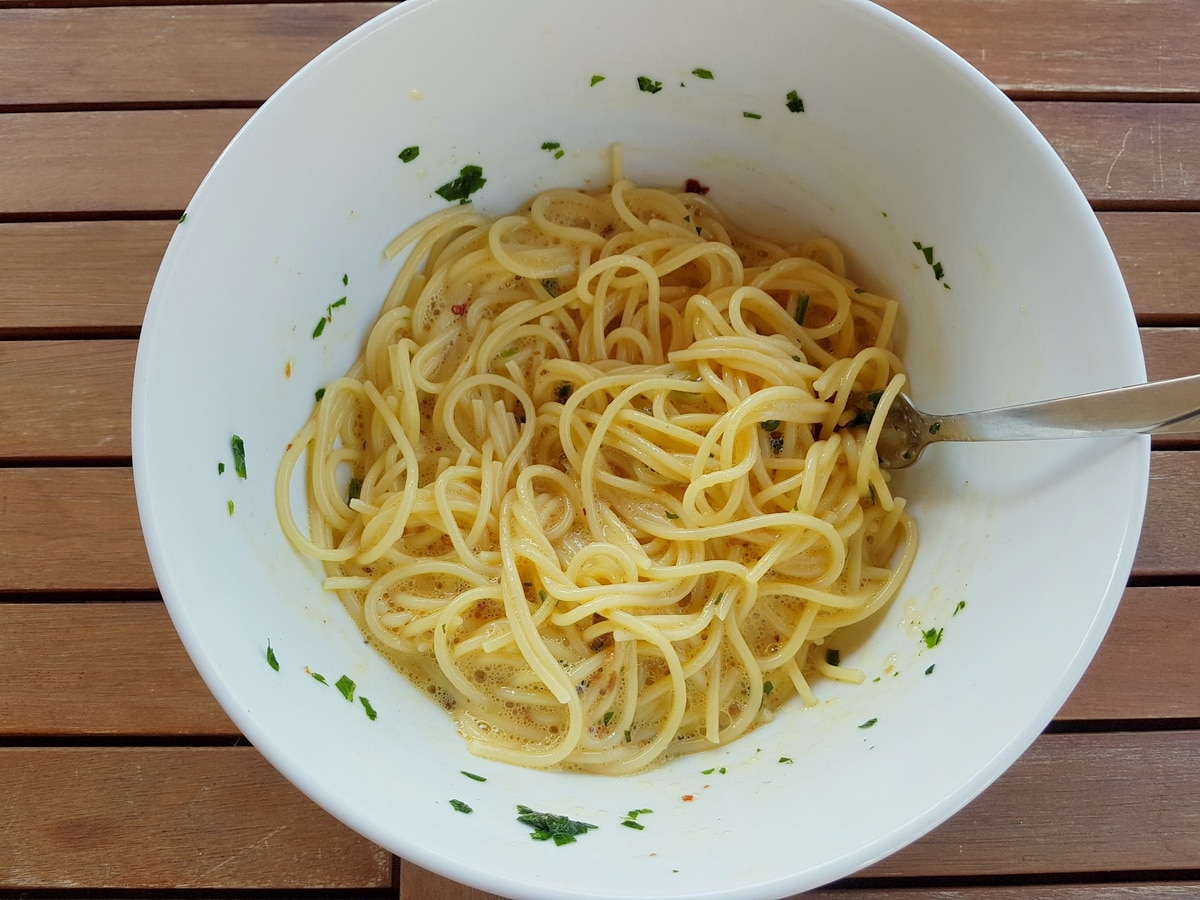
4) Pour the pasta and egg mixture into a large non-stick frying pan. Cook until the bottom side is nicely browned and slightly crispy. Then, carefully flip the frittata to cook the other side until it is similarly browned and crispy.
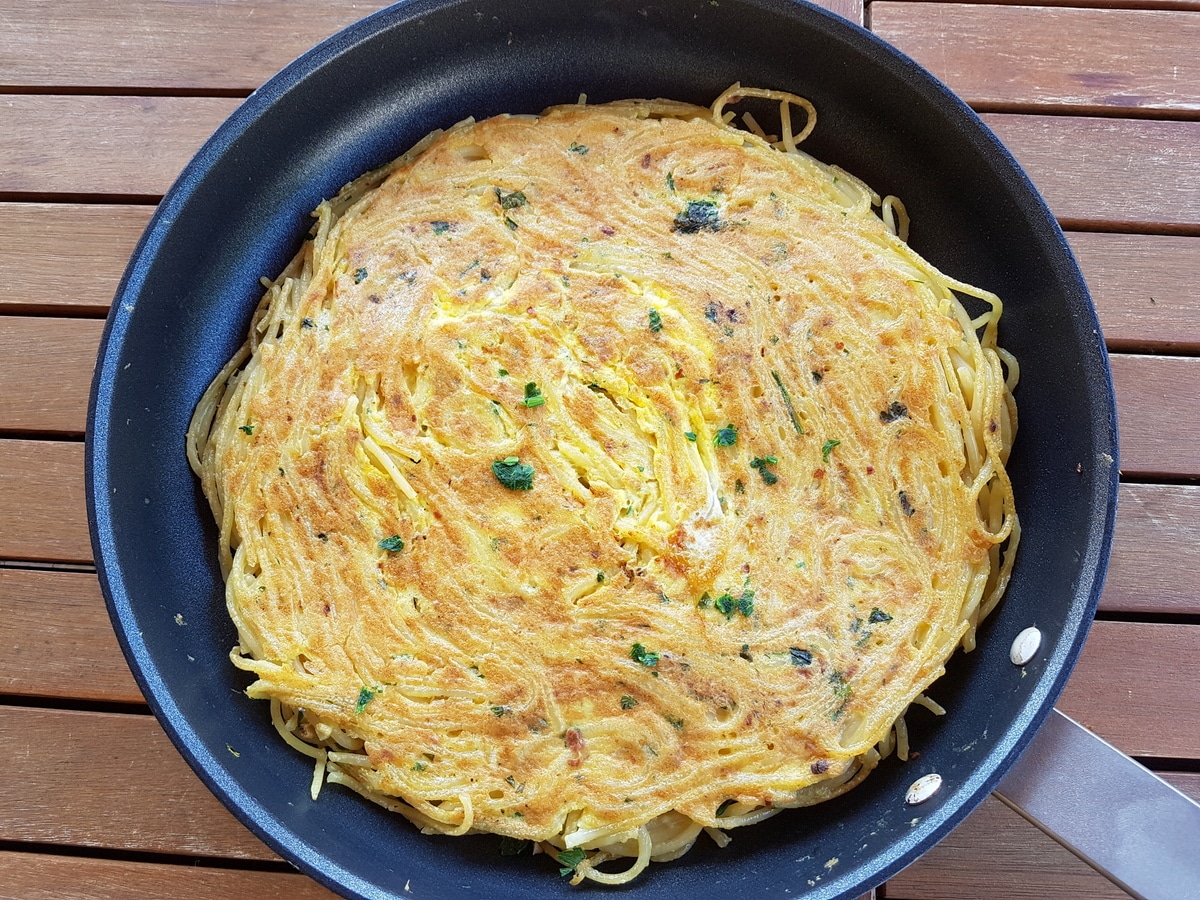
5) Slice and serve the frittata immediately, garnished with additional chopped parsley.
Storage and Leftovers
Allow the pasta frittata to cool to room temperature before storing. Place the cooled frittata in an airtight container and store it in the refrigerator. Properly stored, it will keep for up to three days.
To reheat the frittata, warm it in a skillet over low heat. This method helps to restore the frittata’s original texture and crispness. Alternatively, if you’re in a hurry, you can microwave it to heat it up quickly.
FAQs
If you’re making the frittata ahead of time, cook it just until the eggs are set but not overly browned. Let it cool, then cover and refrigerate. You can then reheat it until hot and slightly crispy on top. Alternatively, you can also cook the recipe as it is and serve it at room temperature!
Yes, you can cook the frittata in the oven. While the term ‘frittata’ originates from the Italian verb ‘friggere,’ meaning to fry, and it is traditionally fried in Italy, oven-baking is an alternative.
To oven-bake your frittata, preheat your oven to 350°F (175°C) and bake the mixture in a well-greased or lined oven-safe skillet or baking dish. Cook for about 15-20 minutes, or until the eggs are set and the top is slightly browned and crisp.
Apart from the eggs, which of course are standard, there are many different ingredients used in Italian frittatas. The main differences between an Italian frittata and a French omelet are that the ingredients in the former are mixed into the eggs before cooking, rather than placed onto the eggs after they have already started cooking in the pan. Plus, a frittata is always circular in shape, thicker than an omelet and takes longer to cook.
The French also don’t put pasta in their omelet! The Italians do and pasta frittatas are very popular and traditional throughout Italy. Whether as a result of frugality or necessity, the pasta frittata was most definitely born out of a desire to use up leftover pasta. Italians use both leftover plain pasta and leftover pasta already mixed with a sauce to make a pasta frittata.
More Recipes You May Like:
If you make this pasta frittata recipe I’d love to hear how it turns out and if you liked it. Please leave a comment here on the blog or on The Pasta Project Facebook page. Looking forward to hearing from you.
Buon appetito!
Pin for Later:
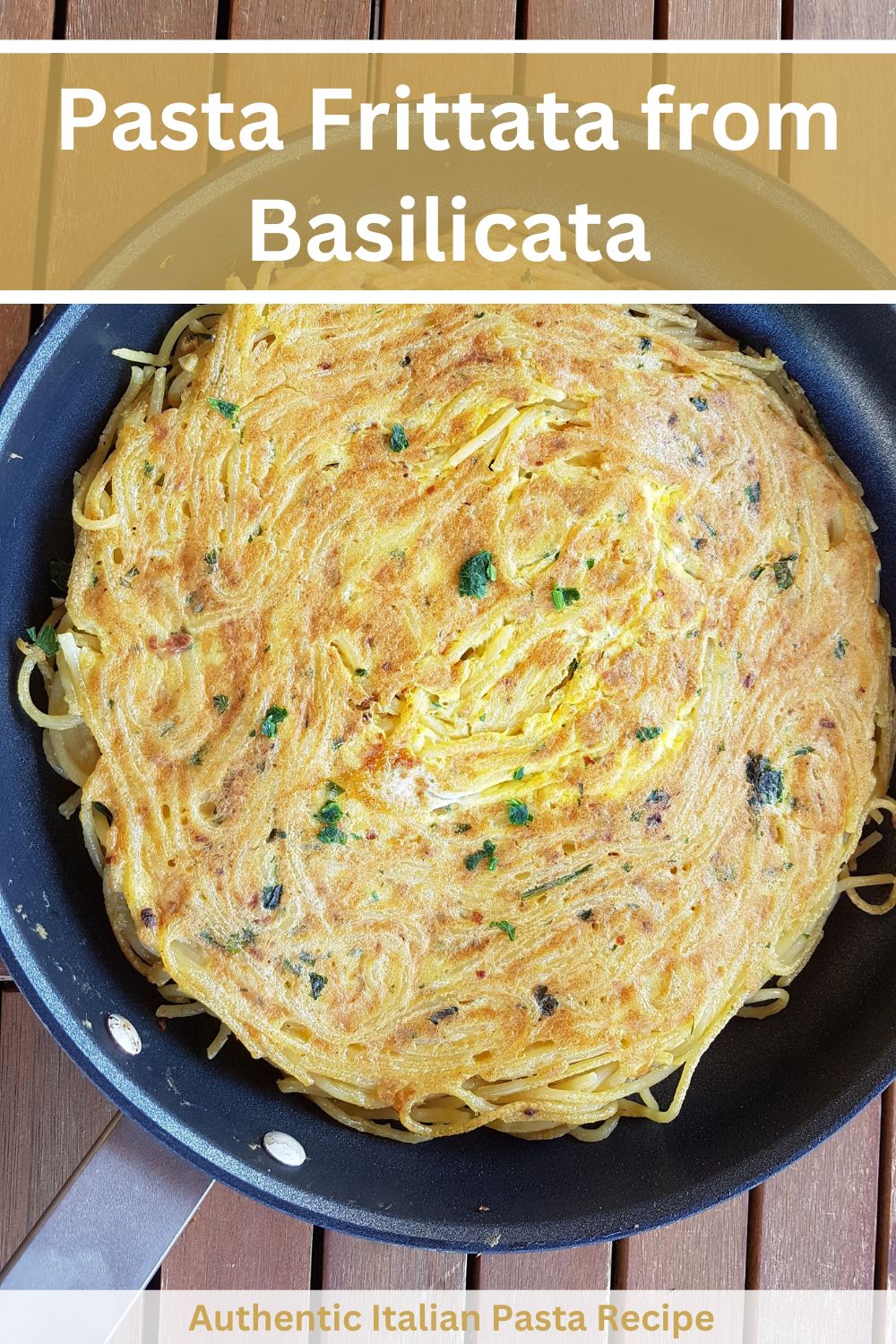
If you are interested in buying some traditional pasta making tools check out my shop page (affliate links). Plus while you’re there why not order a copy of one of my pasta recipe cookbooks? They make great prezzies for pasta lovers!
More Seafood & Lake Fish Pasta Recipes
Reader Interactions
Trackbacks
-
-
[…] Vermicelli Past Frittata from Basilicata by The Pasta Project […]


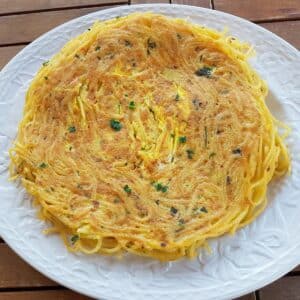
[…] If you’d like to see one of our recipes using Vermicelli click here! Or check out this cool vermicelli frittata from The Pasta […]